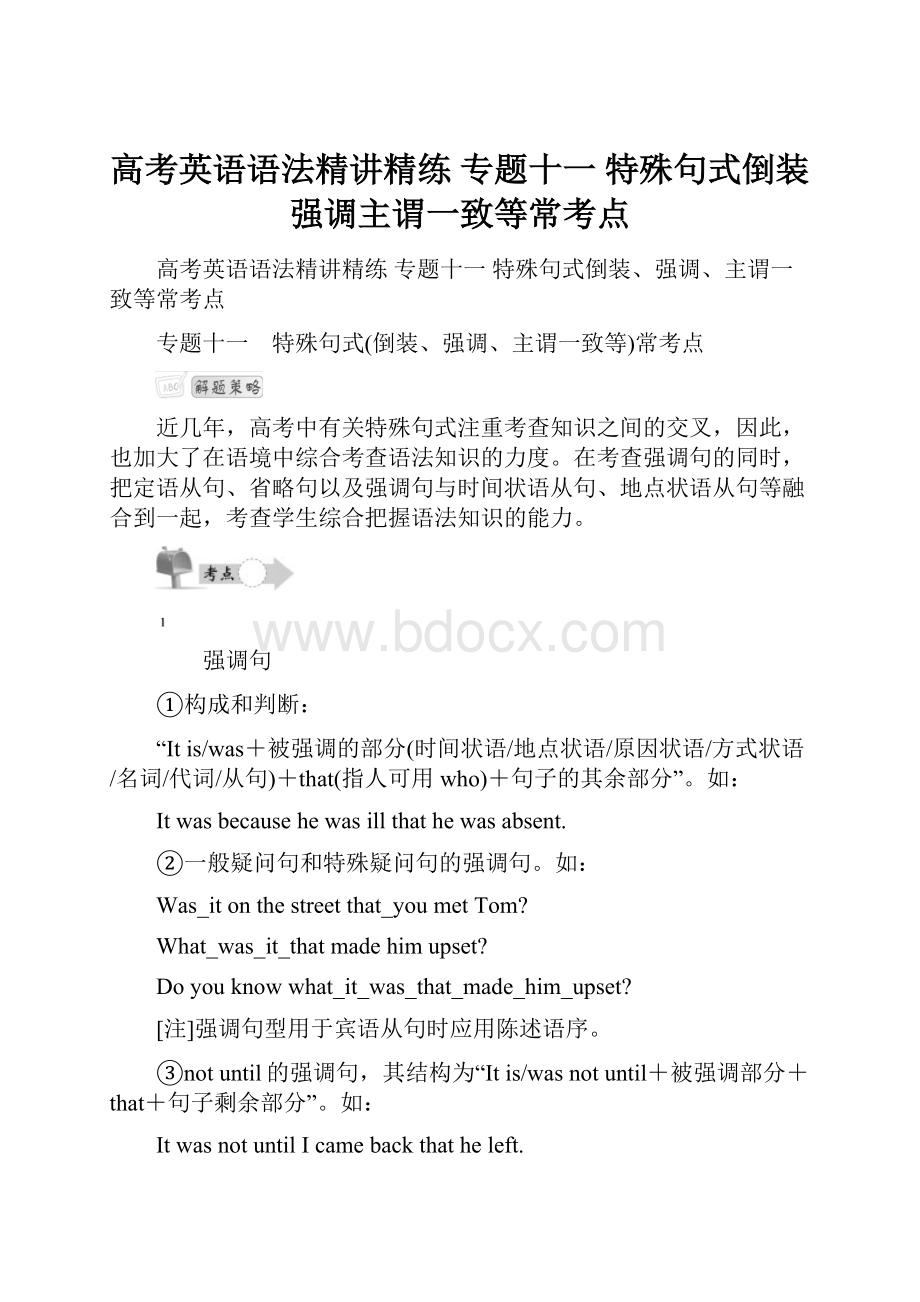高考英语语法精讲精练 专题十一 特殊句式倒装强调主谓一致等常考点.docx
《高考英语语法精讲精练 专题十一 特殊句式倒装强调主谓一致等常考点.docx》由会员分享,可在线阅读,更多相关《高考英语语法精讲精练 专题十一 特殊句式倒装强调主谓一致等常考点.docx(24页珍藏版)》请在冰豆网上搜索。

高考英语语法精讲精练专题十一特殊句式倒装强调主谓一致等常考点
高考英语语法精讲精练专题十一特殊句式倒装、强调、主谓一致等常考点
专题十一 特殊句式(倒装、强调、主谓一致等)常考点
近几年,高考中有关特殊句式注重考查知识之间的交叉,因此,也加大了在语境中综合考查语法知识的力度。
在考查强调句的同时,把定语从句、省略句以及强调句与时间状语从句、地点状语从句等融合到一起,考查学生综合把握语法知识的能力。
强调句
①构成和判断:
“Itis/was+被强调的部分(时间状语/地点状语/原因状语/方式状语/名词/代词/从句)+that(指人可用who)+句子的其余部分”。
如:
Itwasbecausehewasillthathewasabsent.
②一般疑问句和特殊疑问句的强调句。
如:
Was_itonthestreetthat_youmetTom?
What_was_it_thatmadehimupset?
Doyouknowwhat_it_was_that_made_him_upset?
[注]强调句型用于宾语从句时应用陈述语序。
③notuntil的强调句,其结构为“Itis/wasnotuntil+被强调部分+that+句子剩余部分”。
如:
ItwasnotuntilIcamebackthatheleft.
④强调谓语用“does/do/did+动词原形”。
如:
Hedidcomebackyesterday.
①Inmyopinion,Mr.White________goodtohisstudentsinhisclassatpresent.
A.doesdoesB.doesdid
C.doesdoD.diddo
②—Whatdidshewanttoknow,Tom?
—Shewondered________wecouldcompletetheexperiment.
A.whenwasit
B.itwaswhenthat
C.itwaswhen
D.whenitwasthat
③Itwasonthefarm________theyvisited________theygottoknow.
A.where;thatB.which;when
C.that;thatD.which;which
④—________thathemanagedtogettheinformation?
—Oh,afriendofhishelpedhim.
A.WherewasitB.Whatwasit
C.HowwasitD.Whywasit
⑤Itwasabout600yearsago________thefirstclockwithafaceandanhourhandwasmade.
A.thatB.until
C.beforeD.when
【答案】①C ②D ③C ④C ⑤A
it用法
①指代上文的同名同物。
如:
Thereisnomorethanonecopyleft.Willyoubuyit?
②作形式主语和形式宾语。
如:
Itisimpossibletogetthereintime.
IoweittohimthatIcansucceed.
Weshouldbringittohisattentionthatheshouldworkhard.
③like/dislike/hate/appreciate/prefer/want/stand/...+it+从句
④dependon/relyon+it+从句;seeto+it+从句
⑤用于固定短语或句型中。
如:
getit/makeit/catchit/forgetit/it'sworthit/Ican'thelpit/assb.putit/meanit。
⑥指代时间、天气、距离、温度或在打电话、有人敲门等情形时。
①Idislike________whenpeopletalkwiththeirmouthsfull.
A.itB.that
C.thisD.them
②Itworriedherabit________herhairwasturninggray.
A.whileB.that
C.ifD.for
③Youmustseeto________allthechildrenarebeingtakengoodcareof.
A.thatB.it
C.itthatD.whether
④________isourbeliefthatimprovementsinhealthcarewillleadtoastronger,moreprosperouseconomy.
A.AsB.That
C.ThisD.It
【答案】①A ②B ③C ④D
倒装句
①表方式或方位的副词或介词短语置于句首,主语是名词时要全部倒装,且不用进行时倒装。
若主语为人称代词则不倒装。
如:
Incametheteacher.老师进来了。
Inhecame.他进来了。
②分词、形容词放在句首全部倒装。
如:
Hangingonthewallaretwopictures.
③“Only+副词/介词短语/状语从句”放在句首时倒装(在强调句中不可倒装,notuntil也是如此)。
如:
Onlythendidherealizehewaswrong.
Onlywhenyouworkhardwillyousucceed.
④否定词和否定短语(innocase,undernocircumstances,onnoaccount,innoway,onnocondition,bynomeans,atnotime)放在句首时倒装。
如:
Hesaidthatundernocircumstanceswould_he_give_up.
⑤Hardly/Scarcely...when...=Nosooner...than用过去完成时,主句倒装。
如:
Hardlyhadthefootballgamebegunwhenitstartedraining.
=Nosoonerhadthefootballgamebegunthanitstartedraining.
⑥notonly...but(also)...中notonly后的句子需倒装。
如:
Notonlyistheyoungmancleverbutalsoheishardworking.
⑦表示“A...B也(不)...”,用so,neither/nor倒装。
如:
HespeaksChinese,andsodoI.
Hedoesn'tspeakJapanese,andnor/neitherdoI.
⑧so/such...that...(如此……以至于)放在句首时倒装。
如:
Suchagoodteacheris_hethatwealllikehim.
Sogoodis_the_teacher_thatwealllikehim.
⑨as表示“虽然”时,用“名词(不带冠词)/形容词/副词/动词原形+as...”。
如:
Childasheis,heknowsalot.
⑩表虚拟语气中的had,were,should提到主语前。
如:
Wereittoraintomorrow,Iwouldnotgothere.
=Shoulditraintomorrow,Iwouldnotgothere.
HadIattendedthemeetingyesterday,Iwouldhaveseenhim.
①OnlywhenIleftmyparentsforItaly________howmuchIlovedthem.
A.IrealizedB.Ihadrealized
C.hadIrealizedD.didIrealize
②________,hisideawasacceptedbyallthepeopleatthemeeting.
A.Strangeasmightitsound
B.Asitmightsoundstrange
C.Asstrangeitmightsound
D.Strangeasitmightsound
③IhavebeenlivingintheUnitedStatesfortwentyyears,butseldom________solonelyasnow.
A.haveIfeltB.Ihadfelt
C.IhavefeltD.hadIfelt
④Sosudden________thattheenemyhadnotimetoescape.
A.didtheattackB.theattackdid
C.wastheattackD.theattackwas
⑤Notuntil________onTV________thattheChineseshipwasrescuedbytheEuropeanUnionTaskForce.
A.Iturned;didIknow
B.didIturn;didIknow
C.didIturn;Iknew
D.Iturned;Ihadknown
【答案】①D ②D ③A ④C ⑤A
主谓一致
①and连接同一个人、同一事物、同一概念时,谓语用单数。
如:
Thewriterandworkerisintheroom.
②动名词、不定式和从句作主语,谓语用单数。
如:
Educatinggirlsisveryimportant.
③度量衡、国家、报刊、组织、书等后的谓语用单数。
如:
5,000dollarsisalargesumofmoney.
④allof.../mostof.../someof.../halfof.../partof.../therestof.../百分数/分数词/……后的谓语用单数或复数取决于所修饰的名词。
如:
Allofthebookshavebeensoldout.
Allofthemoneyhasbeenlent.
⑤team/band/class/family/public/population/government/committee等集体名词作主语时,需根据其所表示的意思来确定谓语的单复数形式。
如:
Thefamilyismadeupoffivemembers.
ThefamilyarewatchingTV.
⑥“therich/poor/old/young/wounded/dead/living/...(表示“一类人”)+复数谓语”“thenew/old/beautiful/unexplained/...(表示“抽象概念”)+单数谓语”。
如:
Theoldareeasilytakenin.
⑦以manya+n.,morethanone+n.,each/every/no+n.(+each/every/no+n.)作主语时,谓语动词用单数。
如:
Manyastudenthasseenthefilm.
Eachgirlandeachboyhasabook.
⑧“Anumberof...+复数谓语”“Thenumberof...+单数谓语”。
如:
Anumberofstudentsarefondofthebook.
Thenumberofstudentsinourclassis50.
⑨“Quantitiesof+单数名词/复数名词+复数谓语”“Aquantityof+单数名词+单数谓语”“Aquantityof+复数名词+复数谓语”。
如:
Largequantitiesofwaterarebadlypolluted.
Alargequantityofwaterisbadlypolluted.
就近原则(either...or...,notonly...butalso,not...but,neither...nor...,therebe);
就远原则(with,alongwith,togetherwith,aswellas,suchas/like,ratherthan,besides,including,but,except)。
如:
NotIbutTomandJackareright.
NobodybutTomandJackisright.
用所给词的适当形式填空:
①Manyastudent________(have)alreadymadesuchaninterestingexperiment.
②Theteacherandwriter________(be)deliveringaspeechnow.
③Maryalongwithherparents________(be)goingtoattendthemeeting.
④Notonlythestudentsbutalsotheirteacher________(be)interestedinthebook.
⑤Tenyears________(be)amomentinhistory.
⑥Only60percentofthework________(be)doneyesterday.
⑦Quantitiesofgoodearth________(be)beingwashedawayeachyear.
⑧Morethanonestudent________(have)failedtheexam.
【答案】①has ②is ③is ④is ⑤is ⑥was ⑦are
⑧has
反意疑问句
①must,may,might,can,could表示推测时,可先将句子改为Iamsurethat句型,反意疑问句部分的动词形式根据besure后的宾语从句的谓语动词形式确定。
如:
Hemustbeadoctor,isn'the?
=Iamsurethatheisadoctor,isn'the?
Hemusthaveseenthefilmlastweek,didn'the?
=Iamsurethathesawthefilmlastweek,didn'the?
Youmusthaveheardaboutit.
=Iamsurethatyouhaveheardaboutit,haven'tyou?
②当陈述部分带有宾语从句时,反意疑问部分的主语应和主句的主语保持一致。
但陈述部分主句的谓语动词是think,believe,suppose,expect,imagine,guess,besure等,且主语为第一人称时,要对宾语从句的主语反问。
如:
Tomdoesn'tbelieveJanewillsucceed,doeshe?
Idon'tbelieveJanewillsucceed,willshe?
③在并列句中,要对第二个分句反问。
如:
Heisadoctorbuthiswifeisateacher,isn'tshe?
④祈使句后的附加问句不表示反意,而表示一种语气。
其结构为:
否定祈使句,+willyou?
肯定祈使句,+will/won'tyou?
Let's...,+shallwe?
Letus/me/him/...,+willyou?
⑤陈述部分含有seldom,hardly,scarcely,never,few,little,nothing,nobody等否定词或半否定词时,反意疑问部分的动词用肯定形式。
如:
Hecouldhardlybelievehisowneyes,couldhe?
⑥陈述部分含有usedto的反意疑问部分用usedn't或didn't均可。
若含有oughtto时,则用oughtn't或shouldn't。
如:
Thereusedtobeabridgehere,usedn't/didn'tthere?
⑦当主语是everything,anything,something等时,用it反问。
当主语是everyone,anyone,somebody等时,用they或he反问。
如:
Everythingisallright,isn'tit?
Everybodyishere,aren'tthey/isn'the?
⑧回答反意疑问句时应遵循的原则:
看所提到的事物是否已发生或未发生。
如果发生了,用肯定回答,否则用否定回答。
如:
—Youhaven'tbeenherelong,haveyou?
(你在这儿不久,是吗?
)
—No,Ihaven't.Iamnewhere.(是的,我是新来的。
)
⑨therebe结构用there反问。
如:
Therearetwopeoplewaitingoutside,aren'tthere?
That's...,Thisis...用it反问。
如:
Thatisabook,isn'tit?
完成下列句子:
①Don'tforgettoturnoffthelight,________?
②HeknowslittleaboutEnglish,________?
③Mary,feedthechickens,________?
④Hecouldn'thavebeentoldaboutit,________?
⑤Bobtoldyouthattherewasnobodyintheroom,________?
⑥Everythingisallright,________?
Everybodyishere,________?
⑦Idon'tbelieveheiswrong,________?
⑧—Youwon'tgotohisparty,willyou?
—________,ifheinvitesme.
【答案】①willyou ②doeshe ③willyou/won'tyou ④hashe ⑤didn'the ⑥isn'tit;aren'tthey/isn'the ⑦ishe
⑧Yes
否定句
①不带否定词的否定。
如:
farfrom(决不;一点也不)=anythingbut=notnearly=notatall=nowherenear
freefrom...(无……的)
HeisthelastpersonIwanttosee(他是我最不想见的人).
②带否定词的肯定。
如:
Icanhardlywaittoseehim.=Ican'twaittoseehim.
I'veneverheardabettervoice.=HisvoiceisthebestonethatIhaveeverheard.
He'snoricherthanme.=Heisaspoorasme.
There'snothingbutatableintheroom.=Thereisonlyatableintheroom.
③部分否定和全部否定
部分否定用notboth/all/every/...
=both/all/every/...not...;
全部否定用“neither/none/no+名词”。
如:
Allthestudentsdon'tlikethefilm.
=Notallthestudentslikethefilm.
Neitherofthemhasacar.
④否定省略。
如:
Ihope/guess/amafraidso.的否定省略为:
Ihope/guess/amafraidnot.
Ithink/suppose/believe/imagine/expectso.的否定省略为:
Ithink/suppose/believe/imagine/expectnot.
=Idon'tthink/suppose/believe/imagine/expectso.
①—Wouldyouliketogotothecinemawithus?
—Yes,________.Whattimearewegoingtomeet?
A.IwouldB.Iwouldlike
C.IliketoD.I'dliketo
②Itcan'tbeMikewhohasdonesuchafoolishthing.Heis________butafool.
A.nothingB.something
C.everythingD.anything
③—Aren'tyoucold?
—________.I'mboiling.
A.Takeiteasy
B.Farfromit
C.Notalittle
D.That'sallright
④WhileIagreewithmostofwhatyousaid,Idon'tagreewith________.
A.somethingB.anything
C.everythingD.nothing
【答案】①D ②D ③B ④C
省略
①上下文对话中。
如:
—Whatmadehimsoupset?
—Losinghisbike.
②